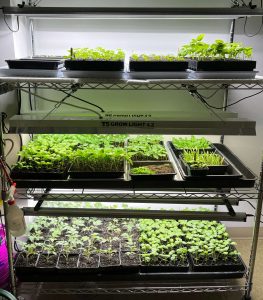Spring 2024 News and Events at Tidewater Farm
Garden Update
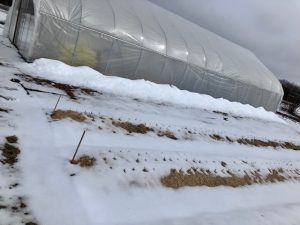
Catching up after the late season winter storms, things are finally full steam ahead at Tidewater Farm! Our young garlic endured two rounds of snow and ice and is looking beautiful .
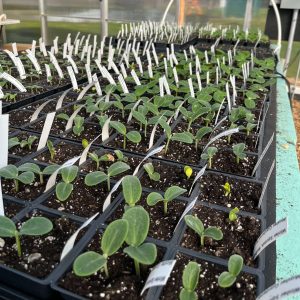
We are sowing early season crops and our onions are in the ground. May also brings the first season of starting annual seedlings in the High Tunnel. Because it’s an unheated structure, we are starting small by seeding cucurbits and some vigorous flowers. We are excited to pilot this endeavor this spring along with everything else that goes into holding the annual Master Gardener Volunteer Plant Sale!
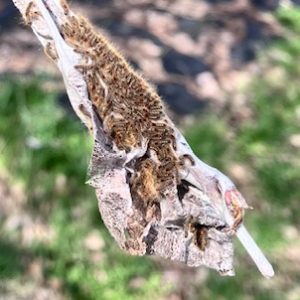 In mid-April, we were able to locate and dispose of some newly hatched Browntail Moth from their winter webs in the treeline bordering the Market Garden. Luckily they were fairly easy to spot in the not-quite-yet foliated trees. We want to make sure we stay on top of any population trying to establish itself in this public space!
In mid-April, we were able to locate and dispose of some newly hatched Browntail Moth from their winter webs in the treeline bordering the Market Garden. Luckily they were fairly easy to spot in the not-quite-yet foliated trees. We want to make sure we stay on top of any population trying to establish itself in this public space!
We are waiting to clean up most of our perennial beds in the Cottage and Children’s Garden until mid-May. Leaving our clean up to mid May allows more protection for both plants and pollinators that rely on the excess leaf litter or plant material for insulation and nesting habitat.
Thanks to a donation from Eden Brothers, we’ve started many of our own seedlings in the office this year. Once the temperatures are warm enough, those seedlings will be moved to the high tunnel to finish growing.
Upcoming Event at Tidewater
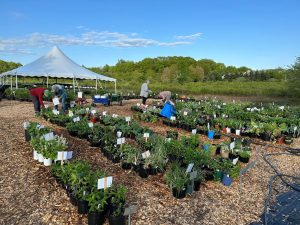
The Cumberland County Master Gardener Volunteer Annual Plant Sale will take place on Saturday, June 1, 9:00am to 1:00pm at the UMaine Gardens at Tidewater Farm, located at 200 Presumpscot Point Rd in Falmouth. Please take note of the new date and time!
Come join this community-focused event, featuring hands-on gardening demonstrations by Master Gardener Volunteers throughout the day, as well as a broad selection of organic vegetable seedlings, herb and annual seedlings, and native and pollinator plants! Gently used garden tools and supplies, bagged organic compost and raffle tickets will also be for sale.
- 10:00 am: Success with Tomatoes with Tom Witwicki
- 10:30 am: Planting and Dividing Tips for Perennials with Nicki Griffin and Priscilla Nicholson
- 11:00 am: Growing Great Blueberries with Joel Leak
Master Gardener Volunteers will be on hand to assist patrons with their plant selections and to offer growing tips. All proceeds from the plant sale go directly towards supporting community-based horticulture projects focused on education and food security.
Featured “Recipe” – 7 Ways to Preserve Spring Herbs
Don’t let those spring herbs go to waste! Check out this resource from Kate McCarty, Food System Professional, University of Maine Cooperative Extension
- Extend herbs’ longevity – First, make sure you are storing your herbs properly so they last as long as possible. We find that storing bunches of herbs in a glass of water in the fridge will keep herbs perky for at least a week. Covering the herbs with a plastic bag helps them from wilting too.
- Dry herbs – Drying (also called dehydrating) herbs is the easiest—it’s hands off and pretty easy. Simply bundle up the herbs you wish to try and tie the stems loosely with a rubber band or piece of string. The bunch should be smaller than the diameter of a quarter or you run the risk of mold forming. Then place the herb bundle in a small paper bag and hang it in a warm, dry place. The herbs are dry when the leaves crumble easily between your fingers and are best stored in an airtight container. Protip: to substitute dry herbs for fresh herbs in a recipe, use a third of the amount called for—i.e. If a recipe calls for a tablespoon of fresh herbs, you can use 1 teaspoon of dried herbs instead.
- Freeze in broth or oil – Herbs freeze well, but without anything to protect them, they often turn black and are unappealing. Instead, finely chop herbs or blend with a liquid like water, broth, oil, or melted butter. Portion the herb mixture into ice cube trays, reusable glass or plastic containers, or plastic zip-top freezer bags. Be sure to label what you’ve made so you use it later.
- Make compound butter – Chefs in fancy restaurants rely on herb-flavored butters, and you can also make some to take your home cooking to the next level. Simply finely chop herbs and mix with softened butter, then shape into a log on a piece of wax paper. Wrap the butter and label it for later use. Think chive butter with warm bread or a thyme-rosemary butter on grilled steak or mushrooms. Refrigerate herb butters for up to a week or freeze for long-term storage.
Check out the full article for more information on freeze drying, infused vinegars, pestos and additional herby recipes!
Wildlife Sightings
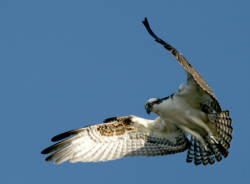
The ospreys are back! April brought the familiar chirping and whistling calls of the ospreys that nest and fish around the Presumpscot Estuary by Tidewater Farm. Most ospreys spend the winter in Central and South America and can log up to 160,000 migration miles in a lifetime.
We often get to see an osprey fly over the gardens with a freshly caught fish glinting in its talons. They will orient the fish head first to reduce air resistance and can fly with a fish up to half its body weight, and this is thanks to their amazing feet. Their foot pads and toes are covered in spines and the outer toe can reverse its orientation to have two toes forward and one back, for supreme gripping abilities!
We have also observed some drama in the sky between ospreys and bald eagles. The Maine Department of Inland Fisheries and Wildlife describes the “intense competition between ospreys and bald eagles for nest locations and fish. They can fish open waters and faster currents much more effectively than bald eagles. Ospreys are generally faster and more agile than eagles, but can fall victim to piracy when an eagle attacks while their flight is hampered by carrying a fish. Often, the osprey drops the fish as the eagle closes in. The eagle shifts attention to the fish and often catches it in midair: what entertainment!”

